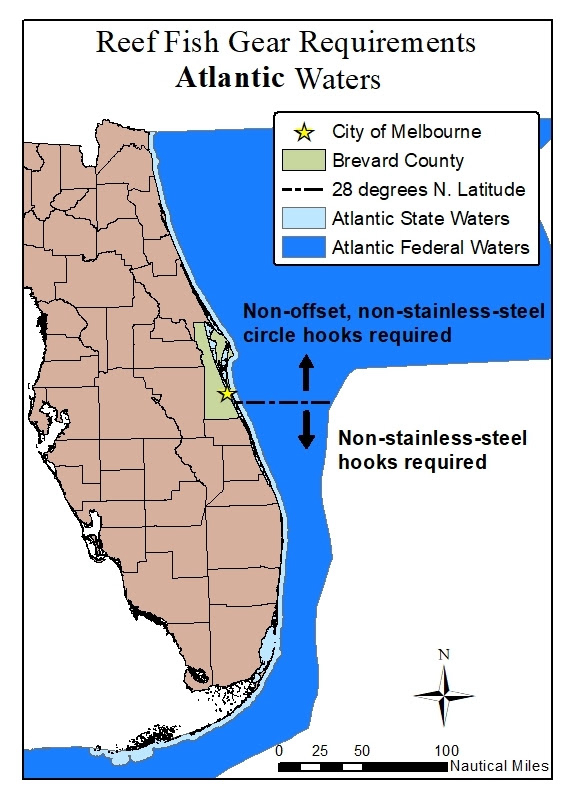
|
At its October meeting, the Florida Fish and Wildlife Conservation Commission (FWC) approved new hook requirements in Atlantic state waters that are intended to improve reef fish catch-and-release survival rates and continue to encourage the use of best fishing practices that help reef fish survive when caught and released.
Starting Jan. 1, 2021, anglers using hook-and-line with natural baits to target reef fish like snapper or grouper from a vessel in Atlantic state waters will be required to use non-stainless-steel, non-offset circle hooks north of 28 degrees north latitude (near Melbourne) and non-stainless-steel hooks south of 28 degrees north latitude.
These changes are consistent with requirements in Atlantic federal waters that recently took effect. Non-stainless-steel, non-offset circle hooks are already required when fishing for reef fish in Gulf state waters and have been a successful tool in minimizing the number of fish that do not survive release.
“We hope that these new hook requirements, along with emphasizing best fishing practices through our educational resources and strategic messaging, will help empower anglers to conserve fisheries for the future,” said Commissioner Mike Sole. “Although not required, it’s also important to have a venting tool or descending device ready to use in case you need to release a fish that is impacted by barotrauma.”
Getting fish back into the water as quickly as possible is important to fish survival. FWC encourages the use of tools such as descending devices and venting tools when barotrauma occurs so long as they do not prolong release. To learn more about proper fish handling techniques, visit MyFWC.com/FishHandling.
Non-stainless-steel hooks should degrade faster in the marine environment compared to stainless steel or other non-corrodible metals. Use of these hooks may ultimately improve survival if the line is broken or the hook cannot be removed, and increase a fish’s chance to shed the hook over time. Additionally, non-offset circle hooks more often hook fish in the mouth rather than the gut, which reduces internal harm to the fish and decreases de-hooking time for the angler, and minimizing damage to the fish’s organs.
Allowing the use of other types of non-stainless-steel hooks south of 28 degrees north latitude accommodates for regionally-important south Florida fisheries, such as yellowtail snapper, in which the use of J hooks allows for greater efficiency and reduced discard mortality.
For the full Oct. 7-8 agenda, including links to background reports, go to MyFWC.com/About and click on “The Commission” and “Commission Meetings.”
Media contact: Amanda Nalley, 850-404-6100 or Amanda.Nalley@MyFWC.com